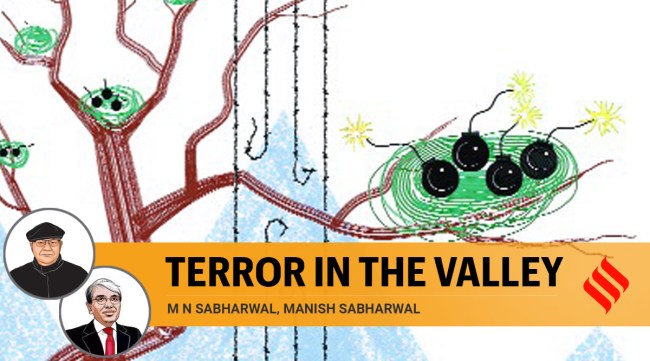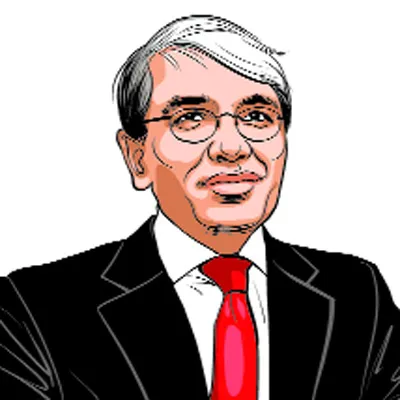Opinion Anantnag attack: Pakistan’s terror factory won’t back down without new calculations
It has been weakened but it needs to be stopped. The world must blunt global terrorism by helping Pakistan’s people to force their defence forces to defend, not rule
 The Valley became the vessel for Pakistan’s anger at itself after the idea of Pakistan died at birth when most Muslims stayed back in India. (Illustration by C R Sasikumar)
The Valley became the vessel for Pakistan’s anger at itself after the idea of Pakistan died at birth when most Muslims stayed back in India. (Illustration by C R Sasikumar) The most tasteless response to the murder of three uniformed bravehearts by terrorists in J&K yesterday came from Farooq Abdullah: Terrorism “will continue until India talks to Pakistan”. His statement contains three false notions: India has invited terrorism, Pakistan has legitimate interests in J&K, and there is somebody in Pakistan whom India can talk with. The sacrifices of Manpreet Singh, Ashish Donchak and Himayun Bhat represent solid and honourable traditions of the uniformed forces that defend India. India will respond but hopes the world recognises the dangers of Pakistan’s deep state.
Pakistan has no legitimate claims on Kashmir anymore than it has on Hyderabad or Bhopal. But the Valley became the vessel for Pakistan’s anger at itself after the idea of Pakistan died at birth when most Muslims stayed back in India. And, it was buried with the creation of Bangladesh. Pakistan’s terror factory was born at a meeting in 1980 between General Zia-ul-Haq and Jamait-i-Islami’s (JEI) Maulana Abdul Bari in Rawalpindi. JEI was founded in 1941 by Maulana Syed Maududi, whose 1920s’ book Jihad in Islam advocated an Islamic state and detailed the vanguard revolutionary tactics that are used by terrorists today. Pakistan’s support of America’s covert war against Russia using mujahideen and ISI was a necessary calculation. General Zia responded to Maulana Bari’s hesitations by asking, “How can the Americans stop us from waging jihad in Kashmir when they are waging jihad in Afghanistan?” Zia suggested he would massively over-inflate the Afghanistan costs — reimbursed by the CIA and Saudis — and divert that surplus to Kashmir. Since 1990, Pakistan has exported over a lakh handguns/AK-47s to J&K, hurting 75,00 families in the region.
Terrorism undermines the fundamental law of war by removing the distinction between combatants and noncombatants. Terrorist outfits like LeT, which kill innocent men, women and children, do not thrive in democracies. They have a totalitarian mindset that recognises no limits to power. Most Western countries — particularly America — believe that terrorism began with the 9/11 attacks. But in The Meadow: Kashmir, Where the Terror Began, Adrian Levy and Cathy Scott-Clark suggest that the kidnapping of six foreigners in 1995 was an early sign of Islamic terrorism expanding its targets beyond India to include Western countries and their citizens. They argue that the early terrorist career of Masood Azhar mirrored Osama Bin Laden’s writing. Levy and Scott-Clark write: “In the mountains of Kashmir that summer, Masood’s gunmen experimented with the tactics and rhetoric of Islamic terror, unveiling to the world extreme acts and justifications that were new at that time but that would soon become all too familiar”. They believed it was a short leap from these kidnappings to the suicidal assaults in New Delhi, Srinagar, New York, Washington, London and Mumbai that killed and injured thousands. In 2002, Masood’s bodyguard adopted tactics honed during the Kashmir kidnapping to abduct a Wall Street Journal reporter, Daniel Pearl, and filmed his horrific beheading. Terrorism knows no boundaries and rotates enemies.
The extremist Wahabi strain of Islam that fuels terrorism has nothing in common with the practically Sufi Ahle-et-Quad Islam sect of Kashmir that keeps the Valley dotted with ziarats, shrines, and relics, considered sacrilege by Wahabis. The roots of this moderation go back centuries – Rajatarangini, Shah Hamdan, Nooruddin Noorani, Lal Ded, and Habba Khatun. Sheikh Abdullah continued them. This syncretic and tolerant Kashmiryat failed to prevent the massacre and migration of Pandits, Hindus and Sikhs in recent decades, but it is real. Kashmir got tangled with Pakistan because of three events. One was Maharaja Hari Singh’s dithering. Second was India’s mistake of taking J&K to the UN in 1948, which made Kashmir a pawn in the bigger Cold War chess game. Most Western Cold War UN resolutions – 13 on Kashmir, with the last one in 1957 — supported Pakistan, and India is grateful to the USSR for their consistent veto. Third was the special constitutional status that allowed local politicians to make an “elite bargain” and make it a closed society and economy.
Pakistan’s garrison state — a term proposed in 1937 by American political scientist Harold Lasswell for violence specialists creating threats to establish the supremacy of the military over the state and society — is incompetent. It has lost all the wars it has fought with India, but thrived because of its partnership with religion. Military propaganda about a conspiracy by Hanud-Yahud-Nasara (Hindus, Jews and Christians) to end Pakistan is believable because of the historical myth about the eternal conflict between Dar-al-Islam (house of Islam) and Dar-al-Harb (house of infidels). But India has more Muslims than Pakistan, and J&K has always had the religious diversity of Jammu and Ladakh. General Pervez Musharraf saying Pakistan Islam ka qila hai (Pakistan is the fortress of Islam) was blatant self-interest masquerading as national interest.
Pakistan’s terror factory won’t back down without new calculations. The LeT did not face any consequence for its attack on the J&K Assembly in 2001. This emboldened the outfit to conduct bigger attacks on the Indian Parliament and Mumbai. Nobel Laureate Thomas Schelling’s framing of deterrence as the promise of future pain is the message of the last two surgical strikes from a highly decisive, more prosperous and less passive India. India will not forget or forgive this murder. But the world must blunt global terrorism by helping Pakistan’s people to force their defence forces to defend, not rule.
Colonel (later Major General) Akbar Khan, the sutradhar (stage manager) of Pakistan’s Kashmir invasion in 1947, like most terrorists, turned on his masters and was arrested for the failed Rawalpindi coup in 1951. But his book Raiders in Kashmir reflects his military’s delusions in suggesting that Indian masses are “superstitious, servile, and debilitated” while Indian soldiers are “weak and cowardly”. Himayun of J&K Police wore the same uniform as his father (and one of us). Maybe his two-month-old daughter someday will wear the same uniform and honour his courage. But she will only consider that choice because of Pakistan’s dangerous deep state.
M N Sabharwal is former Director General of J&K Police and Manish Sabharwal is a J&K-born entrepreneur







